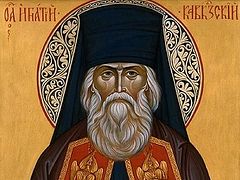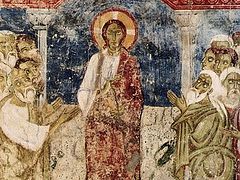Part 1, Part 2
Parts 3 and 4, Part 5, Part 6
Part 7
O Lord and Master of my life! The spirit of love give to me, Thy servant!” We ask for love, which is the fulfillment of the whole law; for if we do not have love, then according to the words of the apostle Paul we are as sounding brass, or tinkling cymbal (1 Cor. 13:1).
Even if we have the gift of prophecy, great knowledge and faith that can move mountains, but don’t have love—we are nothing. The greatest example of love for us is our Lord Jesus Christ. What He said and did throughout the days of His earthly life, and then manifested on Golgotha, is an unceasing sermon on love.
This means that acquiring love is the greatest and most important task of our lives, about which we should be asking always, persistently and ceaselessly—for our goal is to become closer to God and to become perfect, like our Heavenly Father. Without love we are infinitely far from God.
Love is what all the saints cultivated in their hearts, what is given from God as His supremely great gift of grace for fulfilling the commandments of Christ.
Even if a person was born with a meek heart, he has to endure very much and pass through the path of the cross of suffering so that an ever greater flame of Christlike love might burn in his heart; so that the love he was given from his birth would ever multiply.
Especially abundantly were people’s hearts overflowing with Christ’s love during the time of the apostles, when people loved one another like brothers, fulfilling the commandment of Christ. The Lord could say of them, By this shall all men know that ye are my disciples, if ye have love one to another (Jn. 13:35).
But now has come the terrible time about which the Lord spoke, indicating the signs of His Second Coming: And then shall many be offended, and shall betray one another, and shall hate one another (Matt. 24:10). This is what torments and rends our hearts.
It is unbearably hard to live and see that instead of Christ’s love, mutual hatred rages. What an unspeakable horror we experienced not long ago, when the German people, who confess Christianity, in conjunction with other Christian peoples committed such evil acts and mockery of the law of love as we have never seen. And what was left of the law of love in those evildoers who buried children and old people alive, crushed the heads of newborn babes with stones, and wiped out tens of millions of people?
What can we do, how should we look at this? The Love of Christ should be preserved in the hearts of Christ’s little flock until the Second Coming of our Lord Jesus Christ. Those horrors of life, unrighteousness and violation of love that we see every day and every hour should stir us to warm up this great feeling in our hearts.
Love is only given to those who fulfill the commandments of Christ, who walk without turning back upon the narrow path of suffering, no matter what threatens. And if we steadfastly and unceasingly walk toward the light of love, then we shall reach it.
But can we love people who hate us? It is possible, at least in some small measure. Pity is one form of holy love. Shouldn’t we pity with our whole hearts those who have rejected Christ and walk the path of destruction? It is hard to love them with a pure, full love. But it is possible to pity them, with contrition of heart that these unfortunate people are on the path of destruction.
The great St. Seraphim of Sarov was attacked by robbers who beat him nearly to death, broke his skull and ribs, so that he lost consciousness and lay several months in the monastery hospital until the Most Holy Mother of God came and healed him. How did he relate to his offenders? They were apprehended, handed over to the judge, but St. Seraphim begged with tears that they not be punished, that they be set free. He pitied them, and that means he loved them.
Many saints have shown such love. So does God Himself pity and have patience with sinners. Here is one example of God’s longsuffering. There once lived a terrible robber named Varvar, who murdered over 300 people. But later he brought such repentance to God that he was not only forgiven and beloved of the Lord, he also received from Him the gift of working miracles.
Let no one say, “How can I love those who poison our lives and shame our people?” We have to not curse but pity those people, and then Christ’s love will gradually and imperceptibly penetrate into our hearts. The man who always strives to please God, prays, humbles his flesh, and tries to help people around him, will without fail acquire this great feeling and love of Christ, and it will be poured to overflowing into his heart, as it did into St. Seraphim of Sarov for all the thousands of sinners to came to him.
Pray for such love to God with the words of St. Ephraim the Syrian: “O Lord and Master of my life, the spirit of love give to me, Thy servant!” And God will give you the spirit of love!








